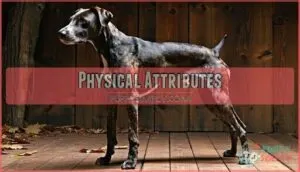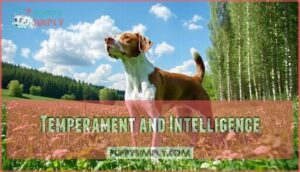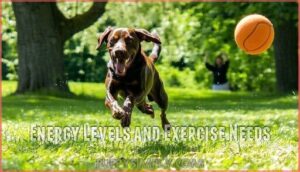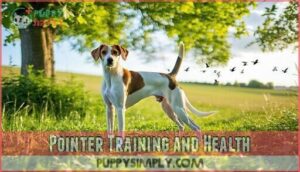This site is supported by our readers. We may earn a commission, at no cost to you, if you purchase through links.

You’ll find these dogs excel at pinpointing prey without scaring it away, making them perfect hunting partners.
Their keen nose can detect scent from impressive distances, while their athletic build lets them cover rough terrain all day.
Originally developed in 17th-century England, pointers combine Spanish and Italian bloodlines to create the ultimate bird dog.
They’re wired to hunt – it’s in their DNA.
Today’s pointers still shine in the field, but they’ve also mastered the art of being loyal family companions.
Their intelligence and willingness to please make training straightforward, though their high energy means they need serious exercise.
Understanding their hunting heritage explains why your pointer might "point" at squirrels in the backyard.
Table Of Contents
- Key Takeaways
- Pointer Dog Origins
- What Pointers Are Bred For
- Pointer Breed Characteristics
- Pointer Training and Health
- Modern Roles of Pointers
- Frequently Asked Questions (FAQs)
- What is a Pointer dog used for?
- What were Pointers used for?
- What are some common health issues that Pointers are prone to?
- How often should Pointers be groomed?
- Are Pointers suitable for apartment living?
- What is the average lifespan of a Pointer?
- Can Pointers be trained to do tricks?
- Which pointer breed is best for beginners?
- Do pointers make good apartment dogs?
- How much do pointer puppies typically cost?
- Conclusion
Key Takeaways
- You’re getting a specialized hunting partner – Pointers were bred in 17th-century England specifically to locate and freeze at game birds, combining Spanish and Italian bloodlines to create the ultimate bird-hunting companion.
- Their pointing instinct is hardwired DNA – You’ll notice even pointer puppies naturally adopt the signature pointing stance when they catch scents, proving this behavior isn’t learned but is genetically programmed from centuries of selective breeding.
- You need to match their energy levels – These athletic dogs require 90+ minutes of daily exercise and mental stimulation because their hunting heritage means they’re built for covering rough terrain all day long.
- You’re getting both hunter and family dog – Today’s pointers excel as loyal family companions while maintaining their field abilities, making them perfect if you want a versatile dog that can hunt and cuddle.
Pointer Dog Origins
You’ll discover that pointers trace their roots back to 17th-century England, where hunters needed dogs that could locate game birds without scaring them away.
These remarkable canines were developed by crossing Spanish and Italian pointer breeds, creating the perfect hunting companion with an instinct to freeze and point toward hidden prey, and were bred with the purpose of being a useful tool for hunters, which makes them a very special breed.
History of Pointers
Pointer origins trace back to 17th-century England, where hunters developed these specialized gun dogs through careful breeding.
English sportsmen crossed local dogs with Spanish and Italian pointers, creating superior bird-hunting companions.
These ancient roots produced dogs with exceptional pointing behavior—freezing when they detected game birds.
This hunter development revolutionized upland hunting, establishing the foundation for modern gun dog evolution, which was a significant result of their careful breeding.
Early Breeding Purposes
During 17th-century England’s golden age of hunting, breeders developed pointers with laser-focused hunting instincts for tracking game birds.
You’ll find their pointing behavior wasn’t accidental—deliberate breeding methods enhanced natural abilities.
These hunting companions excelled at freezing mid-stride, alerting hunters to hidden prey, and through careful pointer development and selective breed origins, they became the ultimate bird hunting partners.
Early training emphasized patience and precision, creating the ultimate bird hunting partners.
Pointers also exhibit characteristics related to service dog traits that can be both beneficial and challenging.
Influence of Spanish and Italian Pointers
Spanish and Italian influences shaped modern pointer breeds through centuries of careful breeding history.
You’ll find Spanish Pointers contributed the foundational pointing stance that defines bird dogs today.
Italian Pointers, particularly the ancient Bracco Italiano dating to the 5th century, brought refined hunting instincts.
These European roots created the genetic blueprint for today’s versatile pointer breeds, blending Spanish stamina with Italian precision in a perfect hunting partnership.
What Pointers Are Bred For
Beyond simply chasing game, you’ll find that pointers were painstakingly developed as specialized hunting dogs with one primary mission: detecting and indicating bird locations through their iconic pointing stance.
These gun dogs represent centuries of careful breed development focused on perfecting hunting instincts that make them invaluable partners for upland game hunting.
Your pointer’s job isn’t retrieval like other retriever dogs. Instead, they’re bred for precise bird detection and pointing techniques that freeze them in position when scent hits their nose.
Pointers don’t chase and retrieve—they freeze like statues when they detect birds, becoming living GPS systems for hunters.
Here’s what makes their gun dog roles so specialized:
- Scent detection – They locate game birds from impressive distances
- Pointing stance – Hold rigid position with raised paw toward prey
- Silent indication – Alert hunters without spooking birds
- Terrain coverage – Navigate diverse hunting grounds efficiently
- Handler cooperation – Wait for commands before flushing game
This pointing behavior isn’t learned—it’s hardwired into their DNA. Even pointer puppies naturally adopt the stance when they catch interesting scents, proving these bird dogs were truly born for the hunt.
Pointers excel in guided hunting environments due to their versatile nature.
Pointer Breed Characteristics
You’ll discover that pointer breeds possess distinct physical and behavioral traits that make them exceptional hunting companions and family pets.
These characteristics stem from centuries of selective breeding focused on enhancing their natural pointing instincts and athletic abilities.
Physical Attributes
Athletic hunters showcase impressive Body Structure that’s built for endurance.
You’ll notice their Athletic Build features well-defined Muscle Tone and streamlined proportions.
Their short coat comes in stunning liver, lemon, or black patterns that require minimal grooming.
The breed’s high energy levels and intelligence make them suitable for active families who understand dog exercise needs.
| Breed Sizes | Coat Types |
|---|---|
| Small (17-21") | Dense, weather-resistant |
| Medium (21-25") | Smooth, low-maintenance |
| Large (25-28") | Water-repellent finish |
Temperament and Intelligence
Why do these dogs consistently rank among the smartest breeds? Your pointer’s Intelligence Levels shine through their exceptional problem-solving abilities and quick learning.
Their Trainability responds best to positive reinforcement, making them enthusiastic students who master commands rapidly. These athletic build companions display remarkable Emotional Stability and Social Behavior.
Pointers require regular exercise and mental stimulation to prevent issues related to high energy levels.
- Intelligence: Pointers learn commands quickly, ranking among top breeds for cognitive abilities
- Loyalty Traits: Form strong bonds with families, showing devotion and companionship
- Social Behavior: Friendly with humans and other dogs when properly socialized
- Trainability: Respond excellently to consistent, positive training methods
- Natural pointing behavior: Instinctively freeze and point, demonstrating their bred-in intelligence
Energy Levels and Exercise Needs
High energy pointers aren’t couch potatoes—they’re canine athletes requiring substantial daily exercise to prevent destructive behaviors.
You’ll need 90+ minutes of physical activity combining walks, runs, and outdoor activities.
Mental stimulation through training sessions and puzzle games keeps their sharp minds engaged.
Without adequate exercise needs being met, these energetic dogs become restless household tornadoes.
Providing the right dog exercise equipment is essential for their physical and mental well-being.
Pointer Training and Health
You’ll need proper training and health management to keep your pointer happy and performing at their best.
These intelligent dogs respond well to consistent, positive reinforcement but require attention to specific health concerns that can affect their active lifestyle.
Obedience Training Importance
Training your pointer requires consistency and the right approach. These intelligent dogs respond well to structured obedience training that builds on their natural keenness to please and high trainability.
Effective training also involves using the right dog training equipment to support the learning process.
Here’s your training roadmap:
- Start with Basic Commands – Focus on sit, stay, come, and heel using Positive Reinforcement techniques that reward good behavior immediately.
- Use Clicker Training – This precise method helps with Canine Communication, marking exact moments when your pointer performs correctly.
- Prioritize Puppy Socialization – Early exposure to different environments strengthens your pointer’s confidence and reduces anxiety-driven behaviors later.
Common Health Issues
You’ll face some health problems with Pointers that need watching.
Hip dysplasia affects 2-4% of dogs, causing joint pain and arthritis. Elbow issues create lameness problems.
Eye problems like cataracts can develop early – sometimes at six months. Bloat threatens deep-chested breeds like yours.
Thyroid disease and skin allergies pop up occasionally. These aren’t hypoallergenic dogs, so expect regular vet checkups for essential dog health.
Understanding common health issues is vital for responsible dog ownership.
Grooming and Maintenance
Unlike some dog breeds requiring elaborate grooming rituals, pointers keep maintenance delightfully simple.
Their short, dense coat needs weekly brushing to control shedding and distribute natural oils.
Regular nail trimming prevents discomfort, while ear cleaning stops infections from developing.
Though not hypoallergenic, their minimal grooming needs make coat care manageable for busy families, with short and dense coats.
Modern Roles of Pointers
While pointers were originally bred for hunting game birds in the 1700s, today’s dogs have expanded into diverse roles that showcase their versatility.
You’ll find these athletic canines excelling as family companions, competitive athletes, and still maintaining their hunting heritage in field trials.
Hunting and Field Trials
Today’s pointer breeds excel in hunting dogs competitions and field trials, demonstrating their inherited Game Locating abilities.
These Gun Dog Training champions showcase Bird Tracking skills in Upland Hunting scenarios. Field trials evaluate their pointing precision and hunting trials performance.
Consider what makes these athletes remarkable, including the use of proper Hunting Dog equipment.
- Speed demons: Pointers cover vast terrain at breakneck pace while maintaining focus
- Living GPS systems: They pinpoint birds with laser accuracy that’ll make your smartphone jealous
- Athletic legends: Less than 2% achieve Field Champion status in dog sports competition
Family Pets and Companion Animals
Today’s pointer breeds make exceptional family pets, trading their hunting heritage for roles as loyal companions and affectionate dogs.
Their intelligent canines adapt beautifully to household integration through proper Pet Care Tips and Socialization Methods.
Their gentle nature meshes perfectly with Family Dynamics, especially when children understand Companion Needs.
You’ll find these family dogs excel at cuddling after exercise sessions.
Participation in Dog Sports
Your pointer’s athletic prowess extends far beyond backyard games.
They excel in scent work, flyball, and dock diving, regularly jumping over 15 feet.
Field trials showcase their legendary pointing abilities, while retrieving sports tap into their hunting heritage.
Multi-sport training actually extends their lifespan by two years, with pointers achieving 85% completion rates in agility trials, and dominating dog sports competitions.
Frequently Asked Questions (FAQs)
What is a Pointer dog used for?
While your neighbors’ dogs lounge around, you’ll find Pointers excel at hunting upland game birds. They’re bred to locate, point at prey, and help hunters flush birds for retrieval.
What were Pointers used for?
Originally, you’d find Pointers working alongside hunters in 17th-century England, freezing in their distinctive stance to locate game birds like pheasants and grouse without spooking them away.
What are some common health issues that Pointers are prone to?
Don’t put all your eggs in one basket regarding your pointer’s health. You’ll need to watch for hip dysplasia, elbow dysplasia, hypothyroidism, progressive retinal atrophy, Addison’s disease, and neurotropic osteopathy.
How often should Pointers be groomed?
You’ll need to brush your pointer weekly to manage their short, dense coat and reduce shedding. During shedding seasons, bump it up to twice weekly for best results.
Are Pointers suitable for apartment living?
Pointers aren’t ideal for apartment living unless you’re committed to providing extensive daily exercise and mental stimulation.
Their high energy levels and need for space make them better suited for homes with yards, as high energy levels can be challenging to manage in smaller spaces.
What is the average lifespan of a Pointer?
Those lucky enough to own these athletic marvels can expect 12-17 years of boundless energy and companionship.
You’ll find genetics, diet, and healthcare substantially influence their lifespan across different pointer breeds, which can be considered a key factor in their lifespan.
Can Pointers be trained to do tricks?
Yes, you can absolutely train Pointers to do tricks.
Their high intelligence and willingness to please make them excellent trick students.
You’ll find they learn quickly when training sessions stay fun and rewarding, though their keen noses might distract them occasionally.
Which pointer breed is best for beginners?
English Setters make excellent beginner pointer breeds. You’ll find them mellow, patient with children, and less intense than other pointers while still maintaining hunting instincts and exercise needs.
Do pointers make good apartment dogs?
Unfortunately, apartment living isn’t ideal for these energetic breeds.
You’ll need unwavering commitment to long daily walks and mental enrichment.
Without adequate exercise and stimulation, they’ll become destructive.
Active outdoor lifestyles suit them best, requiring an unwavering commitment to providing the necessary environment, making long daily walks essential.
How much do pointer puppies typically cost?
You’ll find pointer puppy prices ranging from $600–$1,500 from reputable breeders, though top-quality bloodlines can exceed $3, Adoption costs substantially less at $50–$
Conclusion
Like a compass that always points true north, your pointer’s instincts remain unchanging.
Understanding what pointers are bred for reveals why they’re both exceptional hunters and devoted family pets.
Their centuries-old breeding for bird hunting created dogs with remarkable scenting abilities, athletic endurance, and trainable temperaments.
You’ll find these traits make them excellent companions whether you’re tracking game birds or enjoying weekend hikes.
Their hunting DNA means they need consistent exercise and mental stimulation to thrive in modern homes, requiring consistent exercise and mental stimulation to prevent boredom and stress, and they are excellent with athletic endurance.
- https://www.banfield.com/Wellness-at-banfield/Vaccinations/Dog-vaccinations
- https://kids.kiddle.co/Pointer_(dog_breed)
- https://www.reddit.com/r/interestingasfuck/comments/r4g7kc/the_way_these_pointer_puppies_naturally_know_how/
- https://shootingsportsman.com/point-or-flush/
- https://wagwalking.com/breed/pointer











